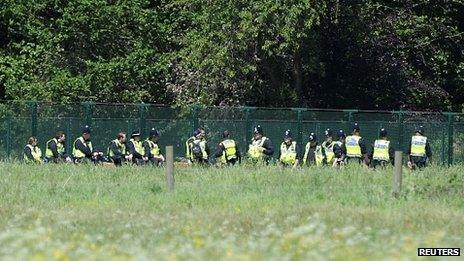GM crop institute's website targeted
- Published

Protesters were stopped from reaching the wheat crop by a police line
The institute conducting a trial of GM wheat in Hertfordshire says its website was taken down by a cyber attack on Sunday.
The attack occurred on the day anti-GM protesters gathered at Rothamsted Research institute to "decontaminate" the field of modified wheat.
But they were stopped from entering the site of the wheat trial by police.
In a tweet, Rothamsted said that "cyber bullying will prevent us informing the public".
A spokesman for the institute in Harpenden said: "We believe this was a distributed denial-of-service (DDoS) attack but it is unclear who was responsible."
He said the website was down from Sunday afternoon until Monday morning.
On Sunday, the group Take the Flour Back said it failed to gain access because the crop in Harpenden, created to deter aphids - a wheat pest - was "hidden behind a fortress".
An order banning protesters from entering the site had been issued on Friday.
"In the past, kids, grannies, and everyone in between has decontaminated GM trial sites together," Take the Flour Back's Kate Bell said.
"Here at the beginning of a new resistance to this obsolete technology, we see GM hidden behind a fortress."
'Remote chance'
The anti-GM group says crops could contaminate the surrounding area with modified pollen. But Rothamsted Research says that is highly unlikely.
Rothamsted's wheat contains genes that have been synthesised in the laboratory; a gene will produce a pheromone called E-beta-farnesene that is normally emitted by aphids when they are threatened by something.
When aphids smell it, they fly away.
Prof John Pickett, a principal investigator at Rothamsted Research, told BBC News there was "a very, very remote chance that anything should get out".
"All it would mean was that some other plant - if it ever did miraculously transfer into another plant - was making a smell like the aphid."
He added: "It's crucially important, as we try to provide more food for the world, to protect our crops."
There is no suggestion Take the Flour Back is connected to the cyber attack.
- Published27 May 2012
- Published21 May 2012
- Published2 May 2012
- Published28 March 2012
- Published24 February 2012